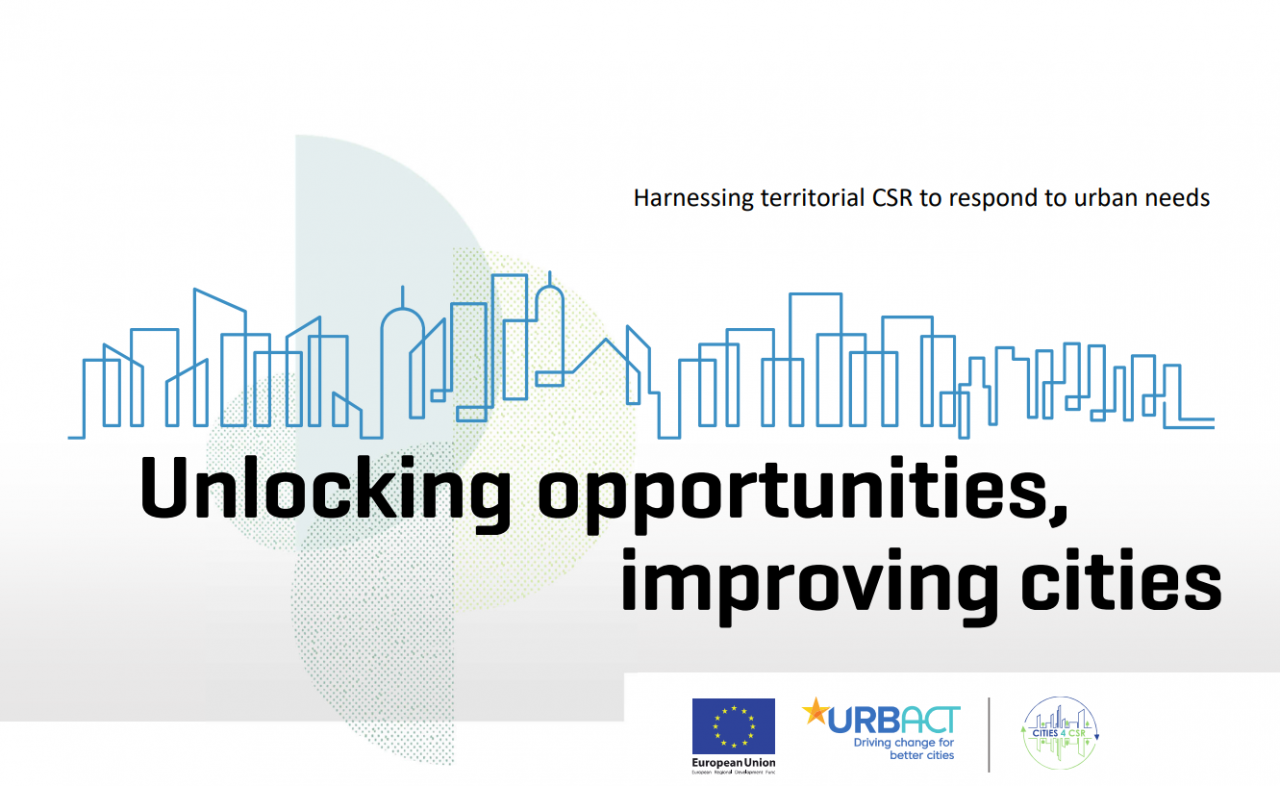
Our CITIES4CSR URBACT Action Planning Network endeavours to develop comprehensive municipal strategies to foster and stimulate corporate social responsibility (CSR) in urban areas across Europe. Put differently, it is about improving awareness, understandings, engagement and collaboration across local CSR-eco-systems, and strengthening the guiding role and steering capacities of municipalities.
Never before has URBACT explicitly focussed on CSR-capacity building; so we are charting new territory right now! Having moved past the project’s half-way mark, it is now time to stand back and reflect on the achievements made, barriers encountered and further work to do. Based on our Mid-Term-Review (MTR) process - including partner survey, in-depth discussions and tailored program support - such a robust self-assessment can be undertaken. Let us share with you essential findings and key recommendations today.
On top of the list stands the shared belief across our network that CSR has an important role to play in urban governance and policy. Whether you speak to our Lead Partner in Milan (Italy) or our Project Partners in Bratislava (Slovakia), Budaörs (Hungary), Guimarães (Portugal), Kekava (Latvia), Molina de Segura (Spain), Nantes Métropole (France), Rijeka (Croatia), Sofia (Bulgaria) and Vratsa (Bulgaria) – all local stakeholder teams believe that CSR can engender collaboration, trust and added value across organisations, sectors and communities. In times where municipalities often lack resources and legitimacy to adequately provide necessary public services, the need for more collaborative urban leadership that incorporates business and other local stakeholders becomes obvious. This premise not only binds our ten project partners tightly together but constantly re-energises local planning and action.
Yet, municipalities, communities and societies face even larger challenges now. Since early 2020 the disruptions caused by the COVID-19 pandemic, and the measures in response to it, have impacted heavily on people and places. They have also affected local engagement processes, transnational co-learning and Integrated Action Planning for URBACT-networks. Our partner survey tells of formidable hurdles; from lack of international travel, lack of local face-to-face meetings and the closing-down of businesses to the more strategically relevant issues of changed stakeholder priorities, difficulties in reconciling agendas between stakeholders, ongoing pressure to adapt to new situations as well as a lack of interest and motivation. Clearly, project teams and stakeholders had to adjust quickly, strongly and creatively to not lose the momentum, energy and direction generated in Project Phase 1. Have they been successful?
According to the MTR-survey project partners have had a relatively positive network experience so far - despite COVID-19. While local teams have often fallen behind project schedule, the proven URBACT-support system has mitigated against deeper pandemic disruptions. The talk is about the ongoing assistance by the Lead Partner team, Lead Expert, external experts, the Programme Manager as well as the URBACT-Secretariat. In particular our digitally organised CSR-Academy, that - similar to a University Masters Class - has brought together invited experts, keynote presentations and productive workshop exercises, scored highly. The reward has been increased understandings and fresh inspiration concerning CSR as well as intense learning about practical and proven solutions. State-of-the-art topics such as municipal procurement, social equity and local activism, local green and climate action as well as ‘Shared Value’ partnerships have illustrated vividly what CSR-in-action can achieve for people and localities.
Success in URBACT, ultimately, depends on well-functioning, effective and highly committed local engines; the URBACT Local Groups (ULGs). So which important ULG-dynamics characterise CITIES4CSR? Perhaps the most important finding is simple; there exists no ‘one-size-fits-all’ model. Local partnership groupings feature various sizes, diverse structures and a variety of processes. Molina de Segura, for example, has created a core ULG group alongside several working groups that all contribute crucial aspects to the overall CSR-strategy. Nantes works with an already established CSR-platform that comprises of a multitude of diverse local stakeholders. Other ULGs are smaller, leaner and more opportunity-driven. Unsurprisingly, ULG-engagement has been strongly impacted by the COVID-19 pandemic. Whereas previously stakeholders could regularly meet face-to-face, pandemic restrictions forced actors into online-based local conversations that can sometimes feel more distant and more disjointed. In, and to, this new world of ‘Zoom’ and ‘Teams’, some local stakeholder groupings adjusted faster than others.
Under these challenging conditions, the proven URBACT-toolbox has surely helped our partners to progress relatively solidly in their transnational and local co-learning journeys. This is true also for our latest addition; the brand-new instrument of Small Scale Actions (SSA). Supported by 10 000 Euro per city, the aim has been to force stakeholders early to engage in shared action and feed the ‘while-you-go’-lessons directly into the Integrated Action Planning process. The MTR-survey results surprised even me: eight out of ten cities regarded this new mechanism as ‘very helpful’ or even ‘extremely helpful’. The diversity of SSAs is striking; cities utilised it as investment, event, tool or combinations of those. On reflection, SSAs galvanise stakeholders early and provide a positive feeling of tangible action, immediate engagement and ‘getting things done’. This powerful engagement mix has been welcomed especially by busy, results-driven stakeholders from business and community backgrounds.
The challenge, however, is to quickly turn attention from the practical, operational level of SSAs to the more ‘big picture’, strategic concerns of the Integrated Action Plans (IAPs) now. So how well is the IAP-process progressing across CITIES4CSR? Overall, project partners have positively self-assessed their IAP-development. Yet, in some cities the state of vision building and objective definition has not kept pace with the project requirements; calling for dedicated catch-up now. Without doubt, all cities have to intensify their work on integrated action definition, planning and resourcing, and better link actions to results indicators that measure success and failure.
Central to a winning IAP-formula is the full-hearted embrace of the URBACT Integrated Approach. In this regard, our network is already building on successful local examples of vertical integration (cooperation between all levels of government, e.g. Nantes), horizontal integration (cooperation across different policy areas and departments, e.g. Molina de Segura), territorial integration (cooperation between neighbouring administrative units, e.g. Kekava) and resources integration between physical and social investments (several good examples).
Given the relatively positive overall performance of project partners, where are the areas, forces and risks that may jeopardise success? And what steps can be taken in order to mitigate risks at city/network and programme levels? After all, both successfully completing the urban CSR-promoting IAPs in the remaining eight months of project time and delivering them in the years to come is neither self-explanatory nor politically un-contested. The MTR-process, and the associated State of Actions - Report, therefore concluded with some thoughtful recommendations to ensure local long-term ‘win-win’ embedded in ‘fit-for-purpose’ institutions. Four ideas stand out.
First, and foremost, all local planning and action should be guided by a mindset and attitude that seeks to ‘turn crisis into opportunity’. In the midst of the most disruptive societal crisis in Europe after the Second World War with wide-reaching effects on people, communities and places, municipalities face multiple and formidable challenges. Just think about the ‘scissor effect’ of more work to be done now with less resources available, to regularly shifting priorities that often favour emergency responses over long-term transitions. Consequently, strategic objectives such as strengthening local CSR-engagement cultures, expanding CSR-toolboxes and seriously embracing ‘Shared Value’-attitudes may, ironically, move down the ‘to-do’-list. Yet, in post-pandemic times, the promise of mutual gains from synergistic municipality-business-civic society relations may clearly outweigh risks and possible side effects. Let us communicate this message - loud and clear!
Second, even with a strong conviction that urban CSR truly matters, we are confronted now with a world of radical uncertainties that pose severe constraints on longer-term planning. In fact, what we plan to today may be disrupted tomorrow. Building project resilience, therefore, is of utter significance if we want our dedicated transnational and local co-learning and engagement efforts to leave a positive, tangible and mobilising legacy for years to come. From my viewpoint, what is needed is a triple focus on 360-degree risk assessment, effective risk mitigation and innovative adaptation strategies.
Third, and concerning long-term implementation, the big risk areas identified in the MTR-process are lacking funds, missing political support and weak implementation capacities. These are certainly sizable, structurally embedded barriers that cannot be changed in a quick-fix and ad-hoc manner. But URBACT-assistance can somewhat help. Asked for specific support required to tackle these problems, cities pointed to three areas; designing sound and robust funding strategies for the IAP and identifying relevant funding sources to ensure long-term success; embedding the IAP-implementation in effective and collaborative multi-level governance arrangements; and creating adequate monitoring systems that incorporate ‘setting-up efficient monitoring & evaluation frameworks’ and ‘aligning specific objectives and results indicators’ in order to measure progress and success.
Fourth, project success may call for creatively re-formulating priorities, re-setting agendas and re-sharpening tools during the remaining project months. Several dedicated instruments to be utilised in transnational fashion may be catalytic in this regard. Local learning diaries may assist with local stock-taking and honestly discerning positive and negative project dynamics. Obviously, this is not about blaming but about learning and improvement! We may also consider pushing messages harder and smarter by improving network communication. Are we really using common-sensual definitions, practical terms, easy-to-grasp languages and powerful narratives? A last suggestion relates to self-assessed project progress. Similar to the SAT4SUD self-assessment tool, CITES4CSR partners could develop a project progress performance monitor that allows achievements and gaps to be easily visualised as base for shared review, common analysis and subsequent action.
So where to from here? While the above presented network self-check sounds overall encouraging, future-proofing urban ‘win-win’ via new engagement modes between municipalities, businesses and civic society across Europe will remain a truly challenging task. Therefore - whether we call it ‘Corporate Social Responsibility’, or ‘Shared Value’ - the quest for mobilising shared actor engagement and joined local activities that effectively confront the serious social, economic, environmental and not least political problems of the post-pandemic world should undoubtedly move to the top of our societal priorities. Helping our ten partners to decode the winning URBACT Integrated Action Plan-formula for their cities in the remaining project months will create the best possible fundament in order to rise to this challenge!
Article written by the Lead Expert Steffen Wetzstein

